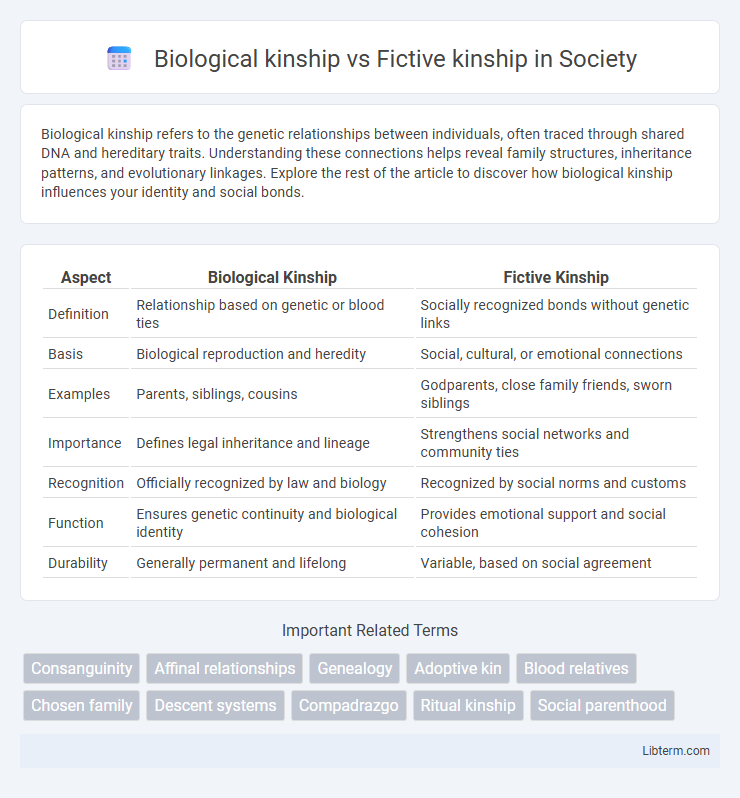Biological kinship refers to the genetic relationships between individuals, often traced through shared DNA and hereditary traits. Understanding these connections helps reveal family structures, inheritance patterns, and evolutionary linkages. Explore the rest of the article to discover how biological kinship influences your identity and social bonds.
Table of Comparison
| Aspect | Biological Kinship | Fictive Kinship |
|---|---|---|
| Definition | Relationship based on genetic or blood ties | Socially recognized bonds without genetic links |
| Basis | Biological reproduction and heredity | Social, cultural, or emotional connections |
| Examples | Parents, siblings, cousins | Godparents, close family friends, sworn siblings |
| Importance | Defines legal inheritance and lineage | Strengthens social networks and community ties |
| Recognition | Officially recognized by law and biology | Recognized by social norms and customs |
| Function | Ensures genetic continuity and biological identity | Provides emotional support and social cohesion |
| Durability | Generally permanent and lifelong | Variable, based on social agreement |
Introduction to Kinship: Definitions and Scope
Biological kinship refers to the genetic relationships formed through blood ties, such as parent-child and sibling connections, which are foundational in anthropological studies for understanding inheritance and familial roles. Fictive kinship encompasses social bonds resembling family relationships that are not based on genetic links, including godparents, close family friends, and clan members who assume kin-like roles. The scope of kinship in anthropology extends beyond biology to include these socially constructed ties, highlighting the cultural diversity in defining family and social organization.
Understanding Biological Kinship
Biological kinship refers to relationships established through genetic connections, such as parent-child or sibling bonds, which are identified via DNA and shared ancestry. These ties influence social structures, inheritance, and individual identity by grounding kinship in biological lineage. Understanding biological kinship involves examining genetic relatedness and its role in shaping family dynamics, health risks, and cultural heritage.
Exploring Fictive Kinship: Meaning and Examples
Fictive kinship refers to social ties that are not based on blood or marriage but are recognized as significant family-like bonds, such as godparents, close family friends, or members of fraternal organizations. These relationships often provide emotional support, social identity, and mutual assistance, functioning similarly to biological kinship in sustaining community and individual well-being. Examples of fictive kinship include chosen families within LGBTQ+ communities and mentoring bonds where individuals consider themselves relatives despite no genetic connection.
Key Differences Between Biological and Fictive Kinship
Biological kinship is based on genetic relationships and direct blood ties, such as parent-child or siblings, whereas fictive kinship involves social bonds that are not based on genetics, like godparents or close family friends considered relatives. Biological kinship emphasizes inherited traits and lineage, while fictive kinship centers on emotional support, social obligations, and chosen family connections. These distinctions affect inheritance rights, social roles, and cultural recognition within different societies.
The Role of Kinship in Social Structures
Biological kinship, based on genetic ties and shared ancestry, forms the foundation of traditional social structures by defining inheritance, responsibilities, and social roles within communities. Fictive kinship, constructed through social bonds and culturally recognized relationships without genetic links, serves to expand and reinforce social networks, offering support systems beyond blood relations. Both types of kinship are instrumental in maintaining social cohesion, regulating alliances, and shaping communal identity across diverse cultures.
Cultural Variations in Kinship Systems
Biological kinship refers to relationships based on genetic connections and direct descent, while fictive kinship involves socially constructed bonds resembling family ties without biological links. Cultural variations in kinship systems influence the recognition and importance of these relationships, as some societies emphasize biological lineage for inheritance and social roles, whereas others prioritize fictive kinship for communal support and social cohesion. Anthropological studies highlight that African, Pacific Islander, and Indigenous American cultures often integrate fictive kinship practices deeply, reshaping kinship definitions beyond biological connections.
Functions and Significance of Fictive Kinship
Fictive kinship serves crucial social functions by creating extended support networks that transcend biological ties, facilitating resource sharing, emotional support, and social cohesion among unrelated individuals. These relationships often fulfill roles of caregiving, social obligation, and alliance-building, particularly in communities where biological kinship may be limited or insufficient. The significance of fictive kinship lies in its ability to adapt social structures to diverse cultural contexts, ensuring group stability and continuity beyond mere genetic connections.
Emotional Bonds: Comparing Biological and Fictive Ties
Biological kinship is grounded in genetic relationships that often foster strong, innate emotional bonds due to shared ancestry and familial roles. Fictive kinship creates similar emotional connections through socially constructed ties, offering support and loyalty comparable to biological family without genetic links. Emotional intensity in both types depends on trust, care, and reciprocal interactions rather than biological origin alone.
Challenges in Distinguishing Kinship Types
Distinguishing biological kinship from fictive kinship poses challenges due to overlapping social roles and emotional bonds that mimic genetic ties. Biological kinship relies on genetic connections and shared ancestry, while fictive kinship is established through social agreements, rituals, or mutual support networks. Ambiguities arise in legal systems, inheritance rights, and social obligations, complicating the recognition and validation of kinship types within diverse cultural contexts.
The Evolution of Kinship Concepts in Modern Societies
The evolution of kinship concepts in modern societies reveals a shift from strictly biological kinship--based on blood relations and genetic ties--to include fictive kinship, where social bonds and chosen relationships mimic familial connections without genetic linkage. This transformation reflects changing social structures, increased mobility, and diverse family forms that prioritize emotional support and mutual care over hereditary lineage. Contemporary kinship systems integrate both biological and fictive elements, highlighting flexibility in social organization and the importance of cultural adaptation in defining family.
Biological kinship Infographic

 libterm.com
libterm.com